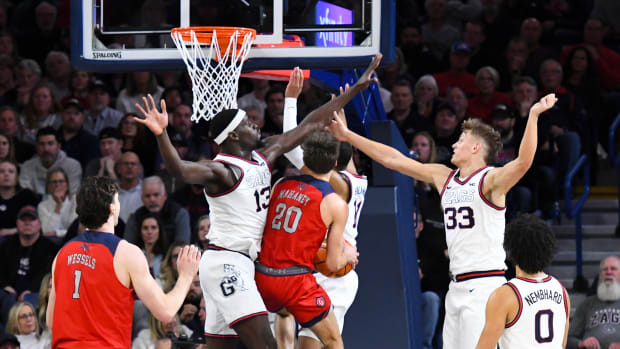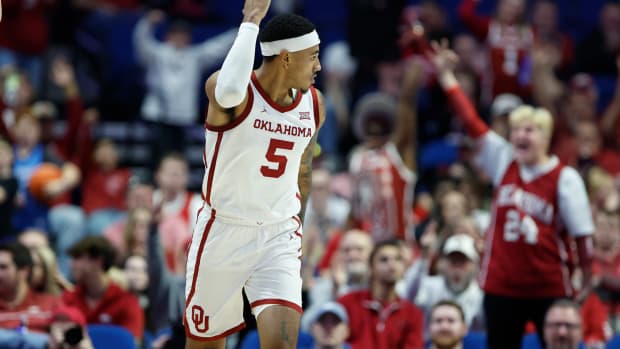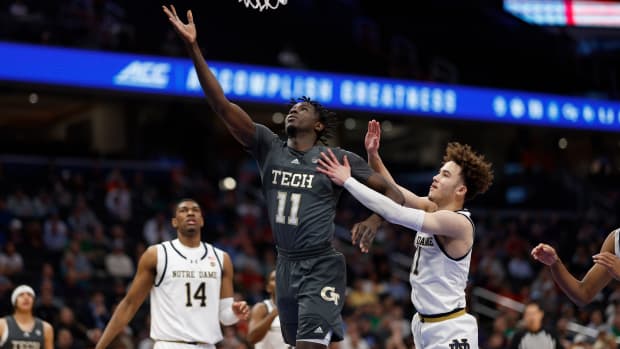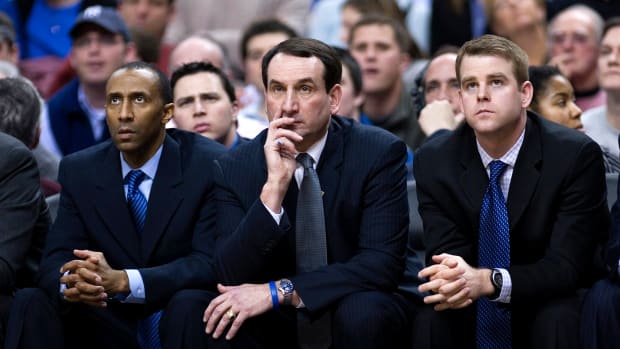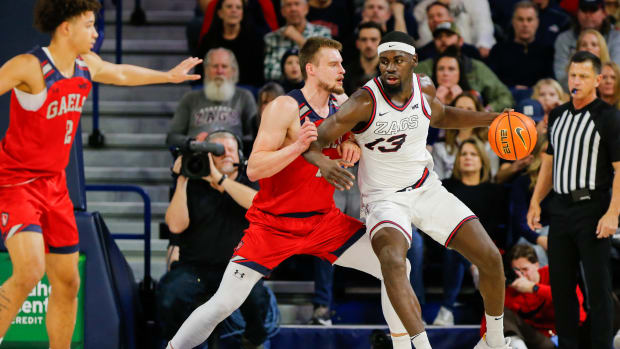
Will Jim Boeheim ever leave Syracuse? In twilight of his career, the Orange coach looks comfortable as ever
HOUSTON — Jim Boeheim is enshrined in the Basketball Hall of Fame, has the court named after him at Syracuse's Carrier Dome and has long been lauded as one of this generation's elite coaches. But if there's ever been a season to reaffirm Boeheim's prodigious sideline acumen, it's been this one. Syracuse is the first No. 10 seed to reach the Final Four in NCAA tournament history. They're here despite starting 0–4 in the ACC and facing double-digit deficits against No. 11 Gonzaga and No. 1 Virginia in the Sweet 16 and Elite Eight. All narratives of this remarkable Syracuse resurrection point to Boeheim, who came back from a nine-game NCAA suspension in January to lead Syracuse to the tournament. Once the Orange got there, Boeheim outclassed Gonzaga's Mark Few and especially Virginia's Tony Bennett by applying a pressure defense neither could overcome.
This unlikely Syracuse run encapsulates the Orange's recent reality under Boeheim, where they've lingered on the precipice of both greatness and infamy. This is the second Final Four for Syracuse in four years, a remarkable achievement sandwiched by an inglorious season of a self-imposed NCAA tournament ban and significant NCAA sanctions that included 108 vacated wins, scholarship losses and five years of probation. At Syracuse, the wins are like the winters—all bathed in different shades of gray.
That NCAA punishment forced the school and Boeheim into the uneasy truce of announcing that he'd retire following the 2017–18 season. It was a way for Syracuse's administrators to feign the appearance that the university ran the basketball program and not vice versa. For Boeheim to publically say "I intend" to step down after three years was an acknowledgement he couldn't do what so many iconic coaches wish—control his own ending.
In June, the university announced that longtime assistant Mike Hopkins, who served as the interim during Boeheim's suspension, would take over in 2018–19. For now, the 71-year old Boeheim says he's aligned with that plan to step away in two seasons. "I've always thought you should walk away when you can't win anymore," Boeheim said when asked if he'd retire if Syracuse won the national title. "I never really thought you should walk away when you do win."
Rich Barnes/Getty Images
Some ambiguity arose about the timetable of Boeheim's departure for several reasons. He used the word "intend" when announcing he'd step down last year and told SI's Seth Davis last month: "I don't think anyone knows what's going to happen in two years." And the portrait of SI's Jack McCallum of Boeheim's tortured state during the NCAA suspension this year didn't paint a picture of someone ready for Del Boca Vista.
In a rare public comment this week, first-year Syracuse athletic director Mark Coyle reaffirmed Boeheim's two-year timetable, telling reporters in Syracuse: "When his current contract expires, that's when his window expires." It was a significant statement because it eliminated any sense that Boeheim's on-court success could dictate a different ending. Those who know Boeheim acknowledge that penning his own exit is important to him. "He hasn't told me what the story is," said former Providence coach Tim Welsh, a former Syracuse assistant and Boeheim confidant. "But he is the program. When you are the program, you have that right [to dictate your ending]. As long as things are not falling apart. And they're not."
When pressed on his departure timetable on Thursday, Boeheim said he has "no plans" to go more than two years. He said retirement "might be this month," and denied saying anything ambiguous about his timetable. Boeheim added Thursday that he has "no plans" to retire if the Orange happen to win this NCAA tournament.
From there, Boeheim fluctuated between sarcastic and snarky, reflective and ethically selective. Boeheim said he regretted Syracuse's NCAA issues but denied gaining any competitive advantage from the violations, which included academic fraud. He also attempted to distinguish cheating from violating NCAA rules, a disingenuous soliloquy that wonderfully illustrates the malleable ethics inherent to running college basketball programs. "When they say cheating," Boeheim said. "That's not true. Rules being broken is a lot different. Cheating to me is intentionally doing something, like you wanted to get this recruit, you arranged a job for him."
Boeheim came to Syracuse in 1962 and essentially never left. He climbed from invited walk-on to star player to assistant coach to head coach. Along the way, through good times and bad, his sour milk sneer has become the face of the school. There's little argument that he's the most influential person in the university's history, as the school's profile rose from regional to national along with the basketball program the past half-century. Along with the national title and the 20-win seasons have come two protracted NCAA investigations and the constant threat of any press conference answer turning into a viral rant. "I stopped trying to prove people wrong a long time ago," Boeheim said, seconds before attempting to differentiate between breaking rules and cheating.
Through all the adulation and probation, winning and swearing, Boeheim has remained unapologetically himself. Those who know him best still wonder what he'll do when he steps away, as the consummate basketball junkie will be without his fix of competition—he's always chased his highs on the sideline.
That's what makes this sun-kissed run quintessentially Syracuse. It's proud moment comes under the shame of probation, and a legend in his twilight with university administrators tip-toeing in his presence. Shining in the winter of his career, Boeheim and Syracuse find themselves in most fitting of places—bathed in grey.

